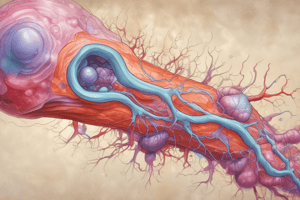Podcast
Questions and Answers
Which hormone is responsible for the increase in blood glucose levels by stimulating gluconeogenesis and decreasing peripheral utilization of glucose?
Which hormone is responsible for the increase in blood glucose levels by stimulating gluconeogenesis and decreasing peripheral utilization of glucose?
- Aldosterone
- Androstenedione
- Dehydroepiandrosterone
- Cortisol (correct)
What is the primary mechanism of action for adrenocortical hormones?
What is the primary mechanism of action for adrenocortical hormones?
- Lipid soluble with receptors in cytoplasm (correct)
- Activation of neurotransmitter receptors
- Activation of insulin receptors
- Binding to cell surface receptors
What is the primary effect of adrenocortical hormones on mineral metabolism?
What is the primary effect of adrenocortical hormones on mineral metabolism?
- Increase calcium reabsorption from the kidney
- Deplete potassium levels
- Decrease serum calcium level through bone deposition (correct)
- Increase calcium absorption from the gut
Which hormones are synthesized by magnocellular neurons in the hypothalamus and carried to the posterior pituitary?
Which hormones are synthesized by magnocellular neurons in the hypothalamus and carried to the posterior pituitary?
Which action is NOT associated with adrenocortical hormones on cardiovascular system?
Which action is NOT associated with adrenocortical hormones on cardiovascular system?
Which system does cortisol suppress through inhibition of interleukin formation?
Which system does cortisol suppress through inhibition of interleukin formation?
What is the primary origin of the cells of the anterior pituitary?
What is the primary origin of the cells of the anterior pituitary?
Which gland is connected to the hypothalamus with the hypophysial stalk?
Which gland is connected to the hypothalamus with the hypophysial stalk?
What controls the secretion of hormones by the posterior pituitary?
What controls the secretion of hormones by the posterior pituitary?
Which hormones are considered adenohypophyseal hormones?
Which hormones are considered adenohypophyseal hormones?
Flashcards are hidden until you start studying
Study Notes
Hormone Regulation
- Glucocorticoids, specifically cortisol, increase blood glucose levels by stimulating gluconeogenesis and decreasing peripheral glucose utilization.
- Adrenocortical hormones, such as glucocorticoids and mineralocorticoids, have a primary mechanism of action involving gene transcription to regulate metabolism and electrolyte balance.
Adrenocortical Hormones and Metabolism
- Adrenocortical hormones affect mineral metabolism by regulating electrolyte balance, with aldosterone controlling sodium and potassium levels.
Posterior Pituitary Hormones
- Oxytocin and vasopressin (antidiuretic hormone) are synthesized by magnocellular neurons in the hypothalamus and transported to the posterior pituitary for storage and release.
Adrenocortical Hormones and Cardiovascular System
- Adrenocortical hormones do not cause vasodilation, which is NOT associated with their action on the cardiovascular system.
Cortisol and Immune Response
- Cortisol suppresses the immune system by inhibiting interleukin formation, which reduces inflammation and immune responses.
Pituitary Gland Development and Anatomy
- The anterior pituitary originates from the ectodermal cells of the Rathke's pouch.
- The pituitary gland is connected to the hypothalamus via the hypophysial stalk.
Posterior Pituitary Regulation
- The hypothalamus controls the secretion of hormones by the posterior pituitary.
Adenohypophyseal Hormones
- Adenohypophyseal hormones include growth hormone, prolactin, thyroid-stimulating hormone, adrenocorticotropic hormone, follicle-stimulating hormone, and luteinizing hormone.
Studying That Suits You
Use AI to generate personalized quizzes and flashcards to suit your learning preferences.




